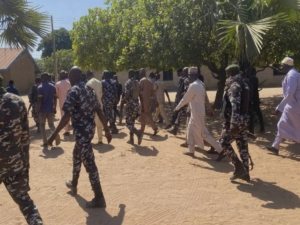Anxiety is rippling through refugee communities across the United States as word spreads of a Trump administration plan to reassess every refugee admitted during Joe Biden’s presidency. Many who believed they had finally secured safety now fear their futures may once again be unsettled.
The directive, outlined in a memo signed by U.S. Citizenship and Immigration Services Director Joseph Edlow, argues that during Biden’s tenure “expediency” and “quantity” were elevated above “detailed screening and vetting.” That claim has alarmed thousands who endured one of the world’s most demanding resettlement processes before being allowed into the country.
Refugee advocates observe that people escaping war or persecution already face years of interviews, checks and long waits before qualifying for resettlement slots. Once in the U.S., they begin rebuilding their lives, creating new communities and often navigating lengthy attempts to reunite with family abroad. Now, even those early steps toward stability feel fragile.
The impending move has triggered immediate reactions.
A Syrian man who arrived under the Biden administration said his household began discussing the memo as soon as the reports surfaced Monday. He spoke anonymously to The Associated Press out of concern that public identification could place him or his relatives at risk.
“It was and it still is a dream to be in America,” he said. “If they start sending back people to their home countries, you don’t have the rights that you have here and the opportunities.”
His family escaped Syria at the onset of the civil war and waited in Lebanon for roughly ten years after applying to the U.S. refugee program. Their eventual approval, he recalled, was a milestone. “It was really an exciting thing to happen,” he said.
The memo signals that individuals who already obtained green cards will also be reviewed. It further orders a pause on green card approvals for refugees who arrived during Biden’s presidency. His family has yet to receive theirs.
Refugee organizations have sharply criticized the plan, warning that reopening nearly 200,000 cases for re-screening is functionally unworkable. Many see the move as another attempt by the Trump administration to weaken a resettlement system that was previously halted and later restricted to 7,500 admissions, largely assigned to white South Africans.
The American Immigration Lawyers Association labeled the effort a “colossal waste of government resources” and questioned “whether any decision by the U.S. government is ever final or reliable.” Advocacy groups argue the administration is creating fear, eroding trust and destabilizing institutions meant to protect vulnerable families.
“The reports of this policy are deepening distress for our clients,” the International Rescue Committee said. “This policy would needlessly retraumatize refugees who have survived unimaginable horrors, have waited decades in some cases for resettlement, and have just begun to rebuild their lives in the United States.” The group appealed for the administration to reverse course.
READ ALSO: Historic South Africa–hosted G20 adopts declaration without the United States
The Department of Homeland Security, however, defended the directive on Tuesday and repeated the argument that Biden-era admissions emphasized rapid processing over rigorous vetting.
“Corrective action is now being taken to ensure those who are present in the United States deserve to be here,” said agency spokeswoman Tricia McLaughlin.
Uncertainty over how the review will unfold has also unsettled people outside the program’s formal scope. Afghans who entered through separate pathways told The Associated Press they were unsure whether their status could also come under scrutiny, illustrating the confusion stirred by the memo’s release and shifting policy signals.
One Afghan doctor in Sacramento, a former interpreter for the U.S. government and father of four, described hearing the news as overwhelming. “Trauma after trauma, stress after stress, anxiety after anxiety,” he said.
Another Afghan man, age 26, who supported U.S. Special Forces for three years and assisted with evacuations, expressed similar fears. He also requested anonymity.
“We went through a lot of screenings and processes before we got our status,” he said. “We don’t know how this is going to turn out for us.”










